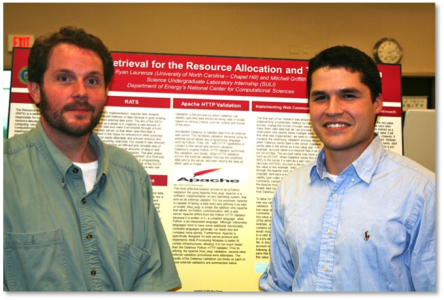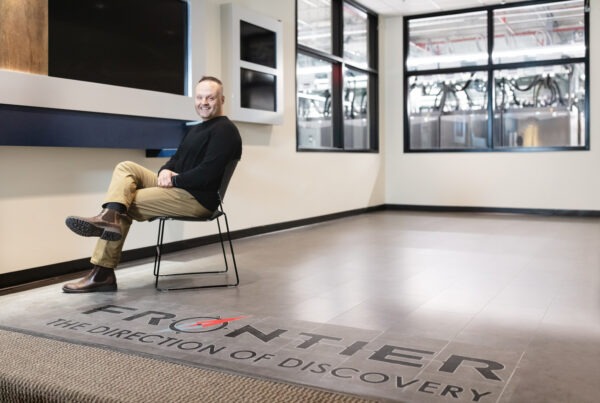Mentors at ORNL supercomputing facility are training computer scientists

The OLCF’s Mitchell Griffith (left) mentored intern Ryan Laurenza of the University of North Carolina at Chapel Hill this summer. Laurenza was one of several students who spent time learning from OLCF mentors over the summer.
At the OLCF, educating the next generation of scientists is a priority. The center hosted a number of activities to this end this summer, including internships for college students and the Appalachian Regional Commission’s (ARC’s) Summer Math-Science-Technology Institute for high school students.
“[We are] training the future computer scientists,” says mentor Adam Simpson of the college-student summer internship program. “Maybe in the future they’ll be running on Jaguar or here at ORNL.”
Over the summer interns Ryan Laurenza of the University of North Carolina at Chapel Hill and Mark Keele of Middle Tennessee State University were working under OLCF computer scientists Mitchell Griffith and Adam Simpson to write code for the Resource Allocation and Tracking System, which is an application for managing high-performance computing (HPC) systems such as Jaguar. At the conclusion of their internships, Laurenza and Keele presented their work at the ORNL Summer 2012 Poster Session and Graduate Student Recruitment Fair. The two made valuable contributions that will aid OLCF users while gaining experience that will help them in their future careers.
“My internship at ORNL was valuable to me because I was able to learn practical skills to use in my career as a computer scientist that I wasn’t able to learn in the classroom,” says Laurenza.
While Laurenza and Keele worked on code for Jaguar, Jerry Sherrod, an associate professor at Pellissippi State Community College and a contributor at ORNL, spent 2 weeks in July teaching high school students from across the Appalachian region the basics of building a supercomputer. During that time the students put together a cluster of Mac Mini computers to work in parallel to solve various problems given them by their instructors.
“The mission of the ARC program is to introduce a new generation of students to the world of high-performance computing,” says Bobby Whitten, the ARC program coordinator. “During that time, they learn that computers can be bent to their will to do tasks instead of just used to check Facebook.”
Many of the students who come to ORNL through the ARC program are from minority groups or underprivileged families. According to Sherrod, who has been an ARC instructor for four summers, one of the goals of the program is to provide opportunities for young people who have not been exposed to science or technology to learn about and work on problems in those areas.
Says Sherrod, “It’s a wonderful experience for these young students from the Appalachian region to be able to come to Oak Ridge and to just be associated with these people working with the best technologies in the world.” —by Leah Moore





